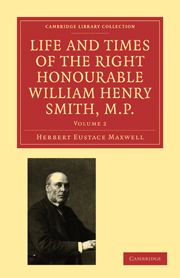Book contents
- Frontmatter
- Contents
- ILLUSTRATIONS TO THE SECOND VOLUME
- CHAPTER I 1878–1880
- CHAPTER II 1880–1881
- CHAPTER III 1882–1884
- CHAPTER IV 1880–1885
- CHAPTER V 1871–1891
- CHAPTER VI 1885
- CHAPTER VII 1886–1887
- CHAPTER VIII 1887
- CHAPTER IX 1888
- CHAPTER X 1889
- CHAPTER XI 1890
- CHAPTER XII 1891
- CHAPTER XIII 1891
- APPENDIX
- INDEX
- Plate section
CHAPTER VII - 1886–1887
Published online by Cambridge University Press: 29 August 2010
- Frontmatter
- Contents
- ILLUSTRATIONS TO THE SECOND VOLUME
- CHAPTER I 1878–1880
- CHAPTER II 1880–1881
- CHAPTER III 1882–1884
- CHAPTER IV 1880–1885
- CHAPTER V 1871–1891
- CHAPTER VI 1885
- CHAPTER VII 1886–1887
- CHAPTER VIII 1887
- CHAPTER IX 1888
- CHAPTER X 1889
- CHAPTER XI 1890
- CHAPTER XII 1891
- CHAPTER XIII 1891
- APPENDIX
- INDEX
- Plate section
Summary
It would be hard to say to which of the two great parties the events of 1886 were destined to prove the more lasting in their consequences, and the immediate position was almost equally perplexing to both. Lord Salisbury was Prime Minister, but as the Government could only reckon 249 supporters among the 670 members of the House of Commons, it was but a question of how many weeks or days after the meeting of Parliament should run before the inevitable downfall of the Administration. But no indication had been given by their adversaries of a definite policy on the dominant question of the day—the government of Ireland. The project attributed to Mr Gladstone, of conceding Home Rule in such measure as would secure to him the support of the Irish party at Westminster, remained as nebular and hypothetical as when it was first bruited in December.
The Earl of Carnarvon's resignation of the Viceroyalty of Ireland was followed by that of his Chief Secretary, Sir William Hart Dyke. This office, which had of late years become the most onerous in the Government, could no longer be adequately filled by a Minister outside the Cabinet. But it was a post which possessed less attractions than any other. During the late Administration it had been filled by three successive Ministers in five years: of these the first had resigned because his colleagues would not suffer him to carry out his policy; the second had been assassinated; of the third, anxiety and worry had changed his comely black beard and hair to snowy white.
- Type
- Chapter
- Information
- Life and Times of the Right Honourable William Henry Smith, M.P , pp. 161 - 186Publisher: Cambridge University PressPrint publication year: 2010First published in: 1893

